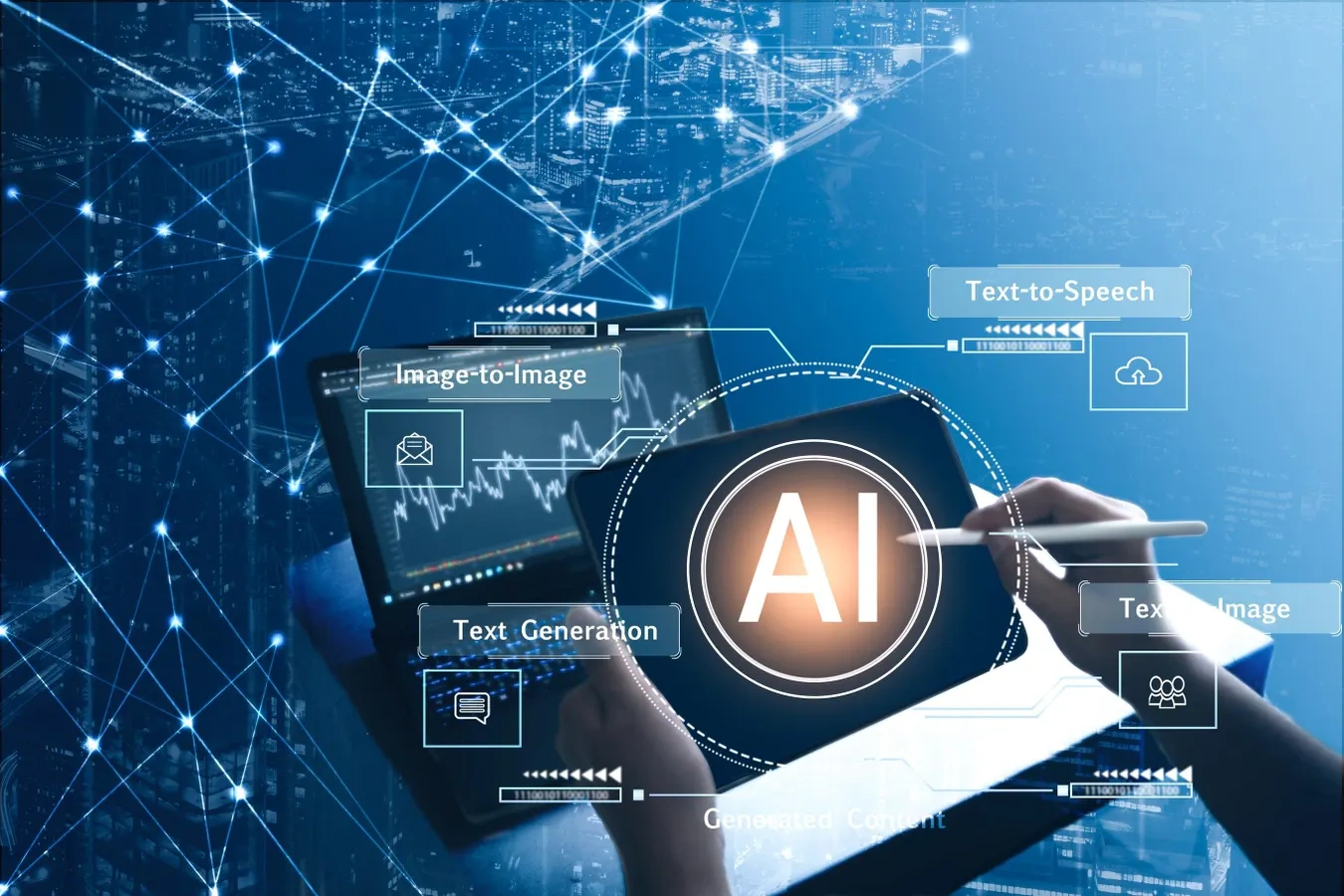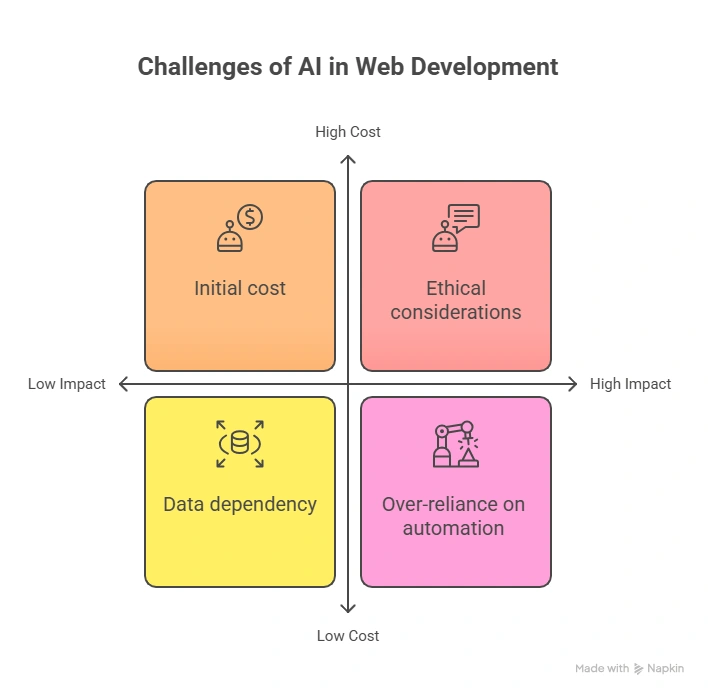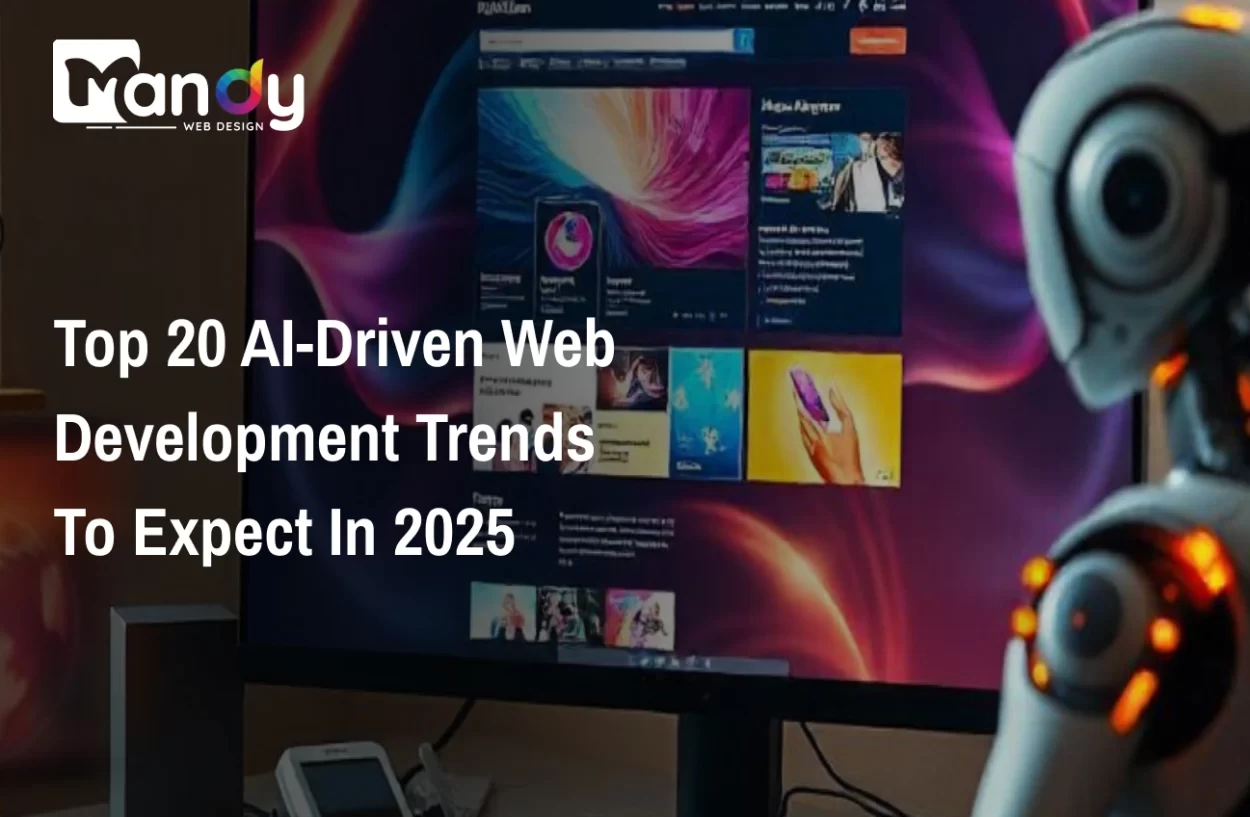We’re already midway through 2025, and AI is changing websites in ways we couldn’t imagine a few years ago. Websites are becoming smarter, faster, and more personalized—not because of more manual work, but because AI is doing the heavy lifting behind the scenes.
From tools that design pages automatically to chatbots that solve problems in seconds, AI is making web development easier and more efficient. It’s helping developers save time, helping users get better experiences, and helping businesses grow with less effort.
In this blog, we’ll break down the Top 20 AI-driven web development trends to expect in 2025. These trends are simple to understand, powerful to use, and impossible to ignore. Let’s see how AI is reshaping the web—and why you need to be ready for it!
The Evolution of AI in Web Development
Today, AI is not just assisting developers—it’s transforming how websites are created and managed. Automated code generators can now write entire sections of a website based on simple prompts. Design tools can suggest layouts that improve usability and engagement automatically. AI-driven testing ensures that websites are bug-free and optimized for speed before they go live.
The biggest change is intelligence. Modern AI doesn’t just execute tasks—it learns from data, predicts user behavior, and improves itself over time. Websites can now adapt to visitors’ preferences, suggest products, and even reorganize content dynamically. This evolution means that web development is faster, more accurate, and more creative than ever.
Why AI Is Becoming Essential for Modern Websites in 2025

Websites today face high expectations. Users demand fast loading speeds, personalized content, instant customer support, and seamless navigation. Meeting all these requirements manually is challenging and time-consuming. This is why AI has become essential.
AI brings several key benefits to modern web development:
- Efficiency: Developers can complete complex tasks faster using AI tools.
- Personalization: AI can adjust content, layout, and product recommendations based on user behavior.
- Accuracy: AI identifies errors, bugs, or performance issues before they affect users.
- Scalability: Websites can handle growing traffic or dynamic content changes without additional manual work.
Top 20 AI-Driven Web Development Trends To Expect In 2025
Here are the most impactful AI-driven web development trends shaping the industry this year. Each trend is explained with examples and real-world applications.
1. AI-Powered Code Generation
AI can now write clean, optimized code automatically. Developers only need to provide basic instructions, and AI tools generate HTML, CSS, JavaScript, or backend code. This reduces manual effort, speeds up development, and minimizes human errors.
For example, platforms like GitHub Copilot or OpenAI’s code tools help developers write complex logic in minutes, allowing them to focus on design, functionality, and user experience. Code generation also makes rapid prototyping possible, so businesses can test website concepts faster than ever.
2. AI Design Assistants for UI/UX
AI-driven design assistants analyze user behavior and suggest layout changes that improve engagement. They can recommend colors, fonts, navigation structures, and content placement to optimize usability.
Tools like Figma’s AI plugins or Adobe Firefly are helping designers experiment faster and test multiple UI/UX variations without manual effort. This ensures websites are visually appealing, user-friendly, and conversion-optimized.
3. Smart Personalization Engines
AI enables websites to deliver personalized experiences in real time. Based on browsing history, location, or previous purchases, AI can display content, products, or recommendations that match each user’s needs.
For e-commerce, this means product suggestions that increase sales. For blogs or news sites, it means content that keeps users engaged longer. Personalization leads to better retention, higher conversions, and more satisfied visitors.
4. AI Chatbots & Virtual Assistants
AI-powered chatbots are smarter than ever. They can understand natural language, handle multiple queries at once, and provide instant support 24/7.
Examples include customer service bots that process orders, troubleshoot issues, or schedule appointments. AI chatbots also learn from interactions, improving their responses over time and reducing the need for human support staff.
5. Voice Search & Voice UI Integration
Voice search is growing rapidly, and AI allows websites to respond effectively. AI can interpret spoken queries, provide relevant results, and even guide users through tasks using voice commands.
This trend improves accessibility and convenience, as users can interact with websites hands-free. Businesses adopting voice UI can capture a growing audience of mobile and smart device users.
6. AI-Based SEO Optimization
AI is revolutionizing SEO by analyzing search trends, identifying keywords, and optimizing content automatically. AI tools can suggest meta descriptions, titles, and headings that improve rankings without extensive manual research.
With AI-driven SEO, websites become more discoverable, attract organic traffic, and stay ahead of competitors in search results.
7. Predictive User Behavior Analysis
AI can predict what users are likely to do next. It analyzes clicks, time spent, and browsing patterns to anticipate actions, like which products a user may buy or which pages they might visit.
This allows websites to proactively display relevant content or offers, increasing conversions and improving overall engagement.
8. AI for A/B Testing & Conversion Rate Optimization
AI simplifies A/B testing by running multiple experiments simultaneously and analyzing results instantly. It can determine which design, content, or layout performs best for different audiences.
This leads to faster optimization cycles, higher conversion rates, and data-driven design decisions.
9. Automated Accessibility Improvements
AI tools can automatically detect and fix accessibility issues, ensuring websites are usable for people with disabilities. This includes alt text for images, color contrast adjustments, and screen reader compatibility.
Automated accessibility not only improves user experience but also helps businesses comply with legal regulations and expand their audience.
10. AI Security & Threat Detection
Cybersecurity is critical, and AI enhances website security by monitoring traffic, detecting unusual activity, and identifying potential threats in real time.
AI can prevent hacking attempts, data breaches, and phishing attacks, ensuring websites remain safe for both businesses and users.
11. AI Recommendations for Content & Products
AI-powered recommendation engines suggest content, products, or services tailored to user preferences. Netflix, Amazon, and other platforms use these systems to increase engagement and sales.
For websites, this means visitors are more likely to explore, spend time, and convert, creating better ROI for businesses.
12. Emotion & Sentiment-Based UI
AI can analyze user emotions through interactions, clicks, and even facial expressions in video-enabled platforms. Websites can then adapt UI, content, or recommendations based on mood or sentiment.
This personalized experience creates stronger connections between users and brands, boosting loyalty and satisfaction.
13. AI-Powered QA & Bug Detection
Manual testing is time-consuming. AI-driven testing tools can identify bugs, performance issues, and broken links automatically. They can also predict areas prone to errors and suggest fixes.
This ensures higher-quality websites, fewer errors, and faster deployment times.
14. Headless & AI-Driven CMS Platforms
Headless CMS platforms powered by AI allow developers to manage content without being tied to a specific front-end. AI can also suggest content improvements, optimize SEO, and automate publishing workflows.
This gives businesses flexibility, scalability, and better performance.
15. AI in Performance Optimization
AI analyzes website performance metrics like loading speed, server response time, and user interaction patterns. It then provides actionable recommendations to optimize these metrics automatically.
Faster websites mean lower bounce rates, better SEO rankings, and happier users
16. AI in E-commerce Automation
E-commerce websites benefit from AI in inventory management, dynamic pricing, sales prediction, and customer support. AI can adjust stock levels, suggest product bundles, and automate repetitive tasks.
This reduces human errors, saves time, and increases profits.
17. Low-Code/No-Code AI Development
AI-powered low-code and no-code platforms allow non-technical users to build websites easily. By simply dragging elements and providing instructions, AI handles the coding, testing, and deployment automatically.
This democratizes web development and enables businesses to launch websites quickly without hiring large development teams.
18. AI-Powered Video & Image Generation
AI can create visuals and videos based on text prompts or user requirements. Websites can use AI-generated graphics, product visuals, and promotional videos without relying on designers or stock images.
This trend reduces costs, speeds up content creation, and keeps visuals fresh and engaging.
19. Real-Time AI Translation & Localization
Global websites need to communicate with diverse audiences. AI can instantly translate content into multiple languages while adapting cultural nuances.
Real-time translation allows businesses to reach a global audience without delays or extra human effort, expanding their market reach.
20. AI + AR/VR Web Experiences
AI combined with augmented reality (AR) and virtual reality (VR) is creating interactive and immersive web experiences. For example, e-commerce sites can let users “try” products virtually, and real estate websites can offer virtual property tours.
This trend is transforming how users explore products and services online, making websites more engaging and memorable.
Challenges of Using AI in Web Development

While AI is powerful, it has challenges:
- Data dependency: AI needs high-quality data to work accurately.
- Ethical considerations: Bias in AI predictions can affect outcomes.
- Over-reliance on automation: Human oversight is still necessary.
- Initial cost: Some AI tools can be expensive to implement initially.
Future of AI-Powered Web Development
The future looks bright. AI will continue to automate coding, design, testing, and personalization. Websites may become fully self-optimizing, adjusting to trends, user behavior, and market changes without human intervention.
Businesses that embrace AI today will lead the digital landscape tomorrow. Developers who master AI tools will deliver smarter, faster, and more innovative solutions.
Bring AI-Powered Websites to Life with Mandy Web Design
Keeping up with all the latest AI web development trends can be hard. That’s where Mandy Web Design, a leading web development agency, can help. We build websites that are modern, fast, and smart, using the latest AI tools to make your site work better for your visitors.
With Mandy Web Design, you get:
- Custom AI-powered designs made for your business
- Better user experience that keeps visitors engaged
- Websites that grow with your business
- Ongoing support to stay updated with AI trends
FAQs About AI-Driven Web Development Trends
AI-driven web development uses artificial intelligence to automate tasks like coding, design, testing, SEO, and personalization. It helps create websites that are smarter, faster, and more user-friendly, improving efficiency for developers and providing better experiences for visitors.
AI improves user experience by analyzing behavior and preferences to provide personalized content, smart recommendations, adaptive layouts, and chat support. This makes websites easier to navigate, more engaging, and tailored to each visitor’s needs, increasing satisfaction and conversion rates.
Yes. AI enhances website security by monitoring traffic, detecting unusual activity, and preventing hacking attempts or data breaches. AI can automatically identify threats in real time, ensuring that websites remain safe for both businesses and their users.
Almost any business can benefit, especially e-commerce stores, blogs, corporate websites, and service-based businesses. AI helps improve engagement, personalization, website speed, and conversions, giving businesses of all sizes a competitive edge and stronger online presence.
Mandy Web Design is a full-service web development agency offering custom website design, AI-powered solutions, SEO optimization, UI/UX design, and ongoing support. We help businesses build modern, engaging websites that attract visitors and drive growth effectively.
Yes. Mandy Web Design creates AI-powered websites with features like chatbots, personalized content, automated SEO, and AI-generated visuals. We combine smart technology and modern design to deliver websites that perform better, engage users, and improve business results.
Absolutely. Mandy Web Design provides scalable, cost-effective solutions for startups, small businesses, and enterprises. Our AI-optimized websites help small businesses attract visitors, improve engagement, and grow online, making professional web development accessible for all budgets.
Mandy Web Design offers ongoing support and updates to keep your website aligned with the latest AI trends. We ensure smooth performance, enhanced security, and improved user experience, helping your website remain modern, effective, and competitive over time.

About the Writer
Mandeep Singh Chahal
Founder/CEO, Mandy Web Design
Mandeep Singh Chahal is the proud Founder/CEO of Mandy Web Design. After completing his graduation from Punjab University, Mr. Mandeep started gaining experience in SEO, Digital Marketing, Web Designing, and Business Development. His years of experience have earned him a reputed Web Design Company – Mandy Web Design.

